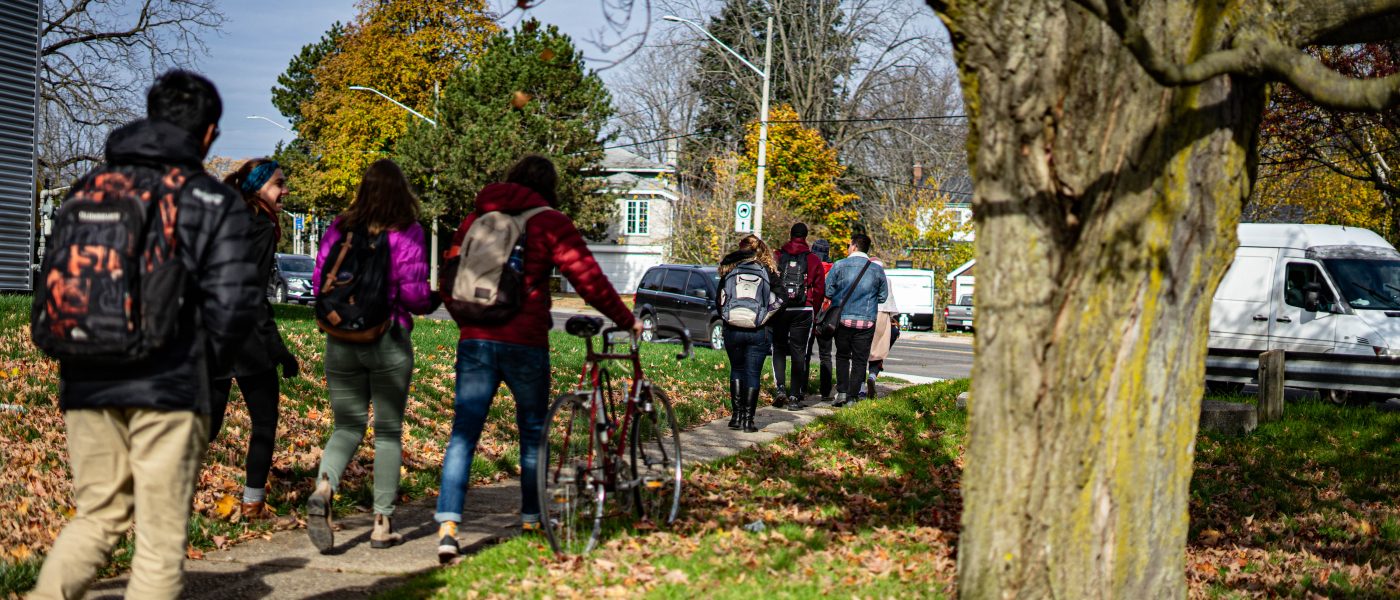Overview
The Interdisciplinary Minor in Community Engagement allows students to deepen and expand their understanding of communities and develop skills for principled and effective engagement. The interdisciplinary nature of the minor allows for a broad knowledge base from which to establish relationships with a range of communities both locally and globally.
Requirements
Students are required to take CMTYENGA 2A03 and 21 additional units from three course lists that include theory, experiential and capstone courses. The course lists can be found in the Academic Calendar.
Information Box Group
What is Community-Engaged Education?
Community-engaged education at McMaster aims to provide students with the opportunity to integrate their academic knowledge with experiences in the community to address social, economic, environmental and health concerns.
Community-engaged education is a type of experiential education that enables students to learn from and collaborate with communities. Community-engaged education can occur within a course or through a co-curricular experience.
CMTYENGA Courses
Information Box Group
CMTYENGA 2A03 - Foundations of Community Engagement Learn More
Regardless of your degree, you will be a member of many communities – your workplace, your professional group, your neighbourhood, your city, your country, the world. You will be called upon to participate in community activities and community change. This course provides you with an understanding of how communities function, the politics and processes involved in community participation and leadership. It will focus on developing the beginning skills for effective and ethical community engagement.
Three hours; one term
Prerequisite(s): Registration in Level II or above; priority will be given to students in Level II
CMTYENGA 2MC3 - Design and Creation of Engaged Learning for Community Youth Learn More
Improve your interdisciplinary collaboration, leadership, and communication skills in this unique course that makes direct ties between McMaster University and our community. McMaster Children and Youth University (MCYU) creates and delivers inquiry-based learning activities for youth aged 7 to14 and their families in all areas of STEAM (Science, Technology, Engineering, Arts, and Mathematics). In this introductory course, you will learn about best practices for pedagogical design; the principles of community-engagement; and the art of knowledge translation and communication from faculty and staff across the university. Applying this knowledge, in small groups, you will create an interactive workshop or a short electronic book chapter for youth-oriented community partner groups including schools, community centres, and after-school programs.
Three hours; one term
Prerequisite(s): Registration in Level II or above
CMTYENGA 2MD3 - Community-based Learning with MCYU Learn More
Get out of the classroom in this experiential and community engaged course. In this non-traditional course, you will have the opportunity to effectively deliver content to youth audiences, work in teams, practice leadership skills, develop presentation and facilitation competencies, and enhance knowledge translation abilities. These learning opportunities will largely come from firsthand experiences as you present MCYU workshops to youth within the community in schools, libraries, and community centres throughout Hamilton. During this course you will learn how to responsibly engage with teachers, parents, youth and other community members.
Three hours; one term
Prerequisite(s): Registration in Level II or above; Completion of 2MC3 is highly recommended
CMTYENGA 3A03 – The Art of Change Learn More
This interdisciplinary course will equip students with the skills and tools they need to support and lead change-based initiatives for a better world. Building on foundational principles of community engagement, students will learn about theories of change, systems thinking, organizational theory and structures, and facilitation techniques and tools used to support community change. Case studies of real-life change initiatives will ground these theories in real-life contexts that help students to understand both how change happens and how individuals can make change when tackling real-world issues. Students will also be provided with an opportunity to work with the Office of Community Engagement on a collaborative project that applies learning towards a real-life community issue.
Three hours; One term
Prerequisite(s):
CMTYENGA 4MM3 – Collaborative Learning with Young People: An Applied Approach Learn More
This course is focused on community engaged education and the MCYU pedagogy of directly involving young people in the design and delivery of their learning. The course will include a capstone project where students will be paired with an elementary school teacher and their class to co-develop an interactive learning experience. The course will also engage students in learning the pedagogical rationale for interactively engaging young people in diverse learning experience through seminar discussion. This course is intended for students with previous experience in community engaged coursework.
Seminar; Three hours; One Term.
Alternates between class meetings and meetings with the partner teacher and elementary school class.
Prerequisite(s): Registration in Level III or above. One of IBH 1AD3, CMTYENGA 2A03, CMTYENGA 2MC3, CMTYENGA 2MD3, ENGLISH 3RW3, or permission of the instructor.
CityLAB Semester in Residence Courses
CMTYENGA 4A06 - Design and Dialogue Inquiry Learn More
Semester at CityLAB (composed of both CMTYENGA 4A06 – Design and Dialogue Inquiry and CMTYENGA 4A09 – Applied Project Experience) is a project based experiential class where students work in interdisciplinary teams mentored by City of Hamilton staff and course instructors to address real challenges faced by the City. Using an inquiry model and drawing on an associated city-identified challenge, this course develops disciplinary capabilities in design thinking, dialogue, project management, and public communication, and prepares students to co-create, test, and evaluate a project. This course requires permission from the Office of Community Engagement.
Six hours; One term
Co-requisite(s): CMTYENGA 4A09
Prerequisite(s): Registration in Level III or IV.
CMTYENGA 4A09 Applied Project Experience Learn More
Semester at CityLAB (composed of both CMTYENGA 4A06 Design and Dialogue Inquiry and CMTYENGA 4A09 Applied Project Experience) is a project based experiential class where students work in interdisciplinary teams mentored by City of Hamilton staff and course instructors to address real challenges faced by the City. In addition to intensive workshops, field trips, and dialogue sessions with staff and community members, students will work in interdisciplinary teams to directly apply their theoretical knowledge and skills to develop and hone a real-life project that addresses a specific challenge faced by Hamilton today. Students will be
exposed to, and participate actively in, the civic life of Hamilton. This course requires permission from the Office of Community Engagement.
One term
Co-requisite(s): CMTYENGA 4A06
Prerequisite(s): Registration in Level III or IV
CE Minor: Request a Course Substitution
Courses that are not listed under the Community-Engagement minor course List A, List B and List C can be considered for inclusion if they meet the criteria of the Minor. Faculty, staff, or students can use this form to submit a course for assessment to be considered as part of the Interdisciplinary Minor in Community Engagement.
Request Course Permissions
CE Minor: Hear from Our Students
This video provides an overview of the Interdisciplinary Minor in Community Engagement and other CMTYENGA courses. Watch to hear about minor requirements, course overviews, and hear students talk about their course experiences!
Read what our students have to say!

Wendy Zhang Learn More
Program: Health Sciences
“To me, community engagement is an approach to solving problems by intentionally working towards building mutual understanding, trust, and a spirit of collaboration. Community engagement involves providing space to listen to the perspectives of community members, and facilitating the creation of equitable and sustainable solutions that best serve the community.”
Wendy Zhang - Learn More
Why did you pursue the minor?
After taking CityLAB Semester in Residence, I had all but three credits required to finish the minor! So I said why not take them, they seem interesting and I would have probably taken them anyway.
What has been your favourite course or project experience?
One course that has taught me a lot about community engagement is the CityLAB Semester in Residence (CMTYENGA 4A06 & 4A09).
I loved that CityLAB was an immersive introduction to community engagement, as it took up my entire course load for a semester. I also appreciated that the curriculum was cohesive and the class size was small, so I got to make some great friendships with other like-minded people. I loved that I was able to see the principles of community engagement in action as we explored local issues, up close. I feel lucky that I had the opportunity to apply my learning while working on my own project in the community.
Examples of courses taken for the minor:
- Foundations of Community Engagement (CMTYENGA 2A03)
- Indigenous Health (HTHSCI 3AH3)
- Introduction to Aging and Society (HLTHAGE 1BB3)
- Communication Skills (HTHSCI 3S03)

Rachel Carson Learn More
Program: Life Sciences (specialization in Sensory Motor Systems)
“Community engagement involves the ongoing process of building positive, mutually beneficial relationships within a community. It extends beyond single, individual actions and can add significance and context to different projects. Most importantly, community engagement is unique because it is applicable across all disciplines, making it essential for positive change.”
Rachel Carson - Learn More
Why did you pursue the minor?
Opportunities within community engagement are endless, no matter what field of study you are in. I decided to pursue the Interdisciplinary Minor in Community Engagement because I knew the skills I would develop would be applicable even after my undergraduate career and I have always been passionate about supporting my community!
What has been your favourite course or project experience?
One course that has taught me a lot about community engagement is The Art of Change (CMTYENGA 3A03).
It incorporates lectures, weekly original podcasts, group work and tackles current community issues. We learn about different community engagement principles and then apply these concepts to the real world through one-on-one group work with a real community partner in Hamilton. I find this contextualizes my learning and allows me to get involved in ways I had not thought of before.
Examples of courses taken for the minor:
- Introduction to Social Work (SOCWORK 1AA3)
- Mental Health & Society (HLTHAGE 2GG3)
- Research Methods in Life Sciences (LIFESCI 2A03)
- Science Communications in Life Sciences (LIFESCI 3P03/SCICOMM 3P03)
- Demystifying Medicine (HTHSCI 4DM3)
- Introduction to Aging and Society (HLTHAGE 1BB3)
- Perspectives on Disability, Chronic Illness and Aging (HLTHAGE 3D03)
- Impactful Initatives in Health (SCIENCE 2P03)

Alyssa Georgescu Learn More
Program: Psychology, Neuroscience & Behaviour
“There are so many unique definitions of community engagement based on who you ask. To me, community engagement is getting a community together to raise awareness, develop new ideas, or tackle a social issue together as one.”
Alyssa Georgescu - Learn More
Why did you pursue the minor?
I wanted to be able to use my newly learned knowledge in Psychology, Neuroscience & Behaviour, and communicate and engage communities I am a part of as well as communities I would like to reach out to.
What has been your favourite course or project experience?
One course that has taught me a lot about community engagement is Foundations of Community Engagement (CMTYENGA 2A03).
I learned hands-on about the planning and startup of creating a dialogue for a community engagement project. It was also amazing to hear from individuals in the community who are facing social inequalities or issues and how we could help them.
Examples of courses taken:
- The World of Entrepreneurship (INNOVATE 1X03)
- An Introduction to Sociology (SOCIOL 1Z03)
- Foundations in Science Communication (SCICOMM 2A03)
CE Minor – FAQs
Expandable List
To ensure a mixture of theoretical and experiential courses, students must take a minimum of six units from Course List A (courses that focus on theory) and a minimum of three units from Course List B (courses that provide the student with relevant skills) and three units from Course List C (projects or capstone courses that involve an advanced community-engaged project and/or community-based research). The courses presented for the minor must include choices from at least two different Faculties (Social Sciences, Humanities, etc.).
Course Requirements:
- Students are required to take CMTYENGA 2A03 – Foundations of Community Engagement plus 21 additional units chosen from Course List A, List B and List C.
- To view the course lists, please visit the Undergraduate Academic Calendar.
Note:All minors are declared upon graduation
Want to learn more about the Minor? Watch this video!
Yes! If you are currently taking a course that is not included in Approved Minor Course Lists and would like to have it count towards the minor, please email us at community.mcmaster.ca, with the following information:
- Your Name
- Your Home Faculty
- Your Program of Study and Level
- Have you already taken these courses, are you currently taking them, or are you planning on taking them?
- Please share with me the course syllabi
- Faculty (of the course you are submitting the request for e.g., Science or Humanities)
- Program (of the course you are submitting the request for e.g., Biology or Philosophy)
- Course Code and Title
- Course Outline (link or attach a copy)
- Name and Email of Course Instructor (who taught when you took the course)
- Have you had any other courses approved for substitutions?
- If yes, please list using Course Code and Title
The Office of Community Engagement offers a suite of Community-Engaged courses (CMTYENGA) that include:
- CMTYENGA 2A03 – Foundations of Community Engagement
- CMTYENGA 2MC3 – Design and Creation of Engaged Learning for Community Youth with McMaster Children and Youth University (MCYU)
- CMTYENGA 2MD3 – Community-based Learning with McMaster Children and Youth University (MCYU)
- CMTYENGA 3A03 – The Art of Change
- CMTYENGA 4A06 – Design and Dialogue Inquiry (CityLAB)*
- CMTYENGA 4A09 Applied Project Experience (CityLAB)*
*CityLAB Hamilton Semester in Residence is a 15-unit program run by the Office of Community Engagement comprised of the following two courses – CMTYENGA 4A06/4A09. These courses must be taken together and are not offered on their own.
Consult with your Faculty Advisor to assess if you can substitute one or both courses for courses counted toward your major. Your Faculty Advisor can help you work out your schedule so that you can take the semester without interfering with other classes.
CityLAB Hamilton is an innovation hub that brings together student, academic, and civic leaders to co-create a better Hamilton for all.
Our vision: provoke students and city leadership to inspire, energize, and build a healthy, sustainable, and vibrant Hamilton.
CityLAB Hamilton Semester in Residence (SIR) is a 15-unit program run by the Office of Community Engagement comprised of the following two courses – CMTYENGA 4A06/4A09. These courses must be taken together and are not offered on their own.
Applications open every year in mid March and are due in mid May. For specific details on how to apply, please visit our CityLAB Semester in Residence Page.
Have you taken CMTYENGA 2A03 – Foundations of Community Engagement, a required course for the minor? If you have not taken this course yet, is it possible for you to enroll before you graduate? Use the Approved Course Lists to review the courses you have already taken and check how many satisfy the requirements.
Email us at community.mcmaster.ca to speak to someone from our office.
There are! The Office of Community Engagement offers two co-curricular programs:
MacChangers –The MacChangers program welcomes students from all faculties and levels of study to collaborate on solution finding to community challenges.
Research Shop – The Research shop is open to upper level (Level III and above undergraduate) and all graduate students to work with public, non-profit, and community organizations in Hamilton to provide plain-language answers to research questions.
Student Success Centre: Start your search in OSCARplus>Student Success Centre>Volunteering where the Student Success Centre (SSC) posts volunteer opportunities regularly. If you would like some 1:1 help finding the right opportunity, they offer peer lead appointments all year. To book go to OSCARplus>Student Success Centre>Appointments>Careers>Volunteering.
For more information on services, programs and events check out the SSC website.
McMaster Children and Youth University (MCYU) Lecture Series Volunteer and MCYU Facilitator: For information on how to become a volunteer, contact the Program Coordinator, Rebecca Young at youngr20@mcmaster.ca
Community Volunteer Circles: Through this program you can volunteer in Hamilton in small groups on a weekly basis.
The McMaster Passport for Aging Education (macPAGE), supported by the McMaster Institute for Research on Aging (MIRA), serves as an online passport for education on aging, care of older adults, and Geriatrics at McMaster University. The macPAGE program was designed to support and encourage a learners’ interest in their opportunities to learn about aging and working with older adults. macPAGE provides participants with the opportunity to enhance their knowledge about research on aging and working with older adults, engage in a variety of educational activities, and share their experiences with other learners in the program. Through successful competition of experiences from four of the seven pillars of education that support further student learning in the field (30 cumulative hours of experiences), participants will receive a MIRA Certificate of Completion in Research on Aging and Engagement with Older Adults. Contact Allison Dubé at warda2@mcmaster.ca if you have any questions.
The Community Engagement and Research Library Guide is an interdisciplinary guide intended for use by students, staff, and faculty looking to understand the Hamilton context as they engage with off-campus communities through teaching, research, and service. The goal of this guide is to offer students, staff, and faculty from all disciplines a strong, relevant evidence base on issues faced by communities mainly in Hamilton, but also in broader geographical contexts (provincial, national, and international). It includes a range of data sets, reports, and other resources from Hamilton and beyond.
- The McMaster Research Shop works with public, non-profit, and community organizations in Hamilton to provide plain-language answers to research questions. Research Shop welcomes all graduate students and upper-level undergraduate students
- The Student Partners Program (SPP) provides undergraduate and graduate students with opportunities to participate as partners with faculty, instructors and staff on projects that contribute to the enhancement of teaching and learning at McMaster. Some research projects may be community engaged. Please check the project descriptions once the calls are out.
- Check your Faculty listing for community engaged research course offerings.
- Faculty of Health Science offers a course open to students from all faculties: HTHSCI 3DD6 A/B- Engaging the City: An Introduction to Community Based Research in Hamilton
- Check with your Faculty job boards. Often, faculty will have funding to hire student research assistants. There may be some opportunities there for Community Engaged Research projects.
The Office of Community Engagement does not connect students directly with placement or work experience opportunities. Please contact your Program Administrator, Faculty Advisor or Co-op/Experiential Education office in your home Faculty for help connecting to these kinds of opportunities.
Absolutely! Please fill out an Intake Form to let us know more about what you are working on and we will follow up to schedule a meeting to learn more information and provide any feedback we can offer.
McMaster’s Access Strategy assists academically qualified students from underrepresented groups in Hamilton and surrounding communities to access university education at the undergraduate level. We work with students to help navigate the application and admissions process and are here to ensure success through to graduation.
Please email questions to access1@mcmaster.ca.
FILL OUT AN INTAKE FORM
Let us know more about what you are working on and we will follow up to schedule a meeting to learn more information and provide any feedback we can offer.
Register for the Minor
Information Box Group
How to Register for an Interdisciplinary Minor Watch a Video Walkthrough
Students can now plan ahead and register for the Interdisciplinary Minor (IM) on Mosaic. Through registering for an IM, students will be able to learn about exciting new courses, discover unique opportunities associated with the minor, and connect with minor administrators and faculty.
Please note: you will still need to track your progress towards completion of the minor and declare your minor at graduation.
Follow these steps to register for an Interdisciplinary Minor in Community Engagement on Mosaic.
- Navigate to Student Centre through the Mosaic Homepage
- From the drop-down menu on the left hand side, select “Service Requests”
- Click on “Create New Request”
- Select “Interdisciplinary Minor” and then hit “Next”
- Select “Interdisciplinary Minor in Community Engagement” and then hit “Next”
- Press “Submit” (Note: You do not need to fill in the comment box)
Once submitted, you will be able to track the progress of your Interdisciplinary Minor registration through the Student Centre dropdown menu for “Service Request.”
If you have any questions, please contact community@mcmaster.ca
Declare Your Minor
Information Box Group
How to Declare Your Minor
When you apply for graduation, you will need to declare your minor. Once you have been approved for graduation, you will be able to access the Minor/Certificate Application on Mosaic. Follow the steps below to declare your minor:
- Log onto Mosaic
- On the Mosaic Homepage, click the “Minor/Certificate Applications” tile
- Click “Minors” on the left hand tab
- In the Select Minor section, search for the code “COMENGAGMN” with the description “Interdisciplinary Minor in Community Engagement”
- Next, enter all the courses you took to qualify for the minor, adding a row for each course
- Click submit
Once submitted, your Faculty will verify that the requirements have been met and, if successful, your transcript will indicate that a Minor has been obtained.
Please note: if you received approval to substitute a course that is not listed in any of the course lists, make sure to share the approval with your Academic Advisor.

